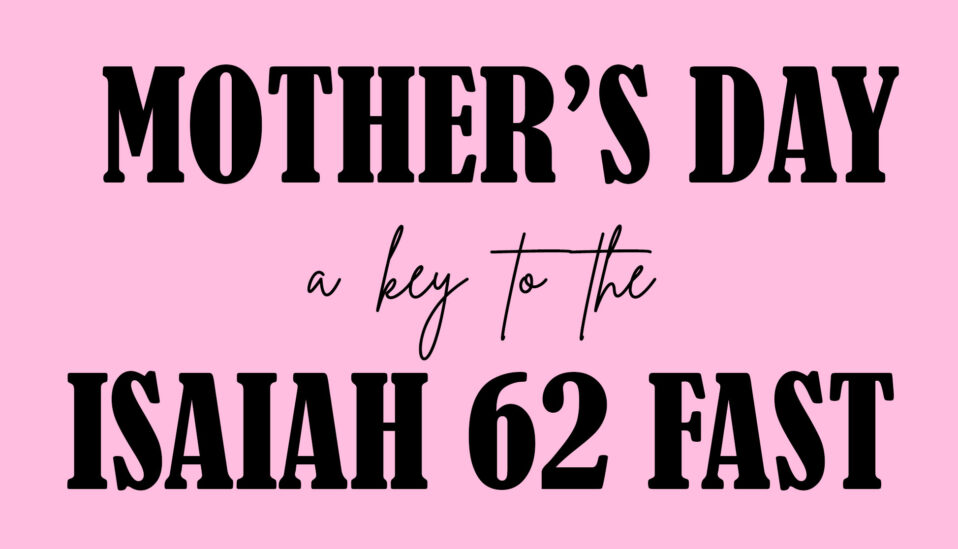Happy Mothers Day to every mother in the Body of Messiah who has birthed or nurtured biological or spiritual children! Mothers Day is always a special occasion but this year, it has even more significance than usual.
As you may know, believers around the world are fasting and praying for Israel’s restoration from May 7 to Pentecost Sunday, in an Isaiah 62 fast. In this global fast May 14 is a uniquely important day. Not only is it Mothers Day in some parts of the world, but May 14 also marks Israel’s 75th anniversary as a formally restored state according to the Gregorian calendar used around the world. While Israel officially celebrates its Independence Day according to the biblical calendar, May 14 is a day for the nations — especially the ekklesia of the nations — to honor and celebrate Israel’s covenant-based, miraculous and prophetic restoration. Therefore, it is a day to honor and celebrate our covenant keeping God.
May 14 is also the first day of Week 2 of the global fast. During Week 2, organizers of the fast encourage us to meditate on, and pray into, aspects of God’s unique covenant with Israel. Therefore, May 14 launches us into not just a day, but a full week to honor and celebrate God — specifically for His covenant keeping character and ways.
There’s still more. The convergence of Mothers Day with Israel’s 75th anniversary reminds us that in a certain real sense, Israel is the spiritual mother of the Church. As such, Christian believers are called to honor and bless her.
The mystery of Israel as a spiritual mother of the Church is opened to us in the book of Ruth. Ruth provides not only an historical account of past events, but a beautiful allegory about Israel and the Church as mother and daughter. In the book, Naomi symbolizes the Jewish people and Ruth symbolizes Gentile Christians who love and align with the Jews.
Naomi calls Ruth “my daughter” only after Ruth blesses her by gleaning in harvest fields to gather food necessary to sustain her and Naomi (Ruth 2:22, 3:1). Bear in mind the word for “bless” in Hebrew denotes kneeling to enrich another. So it is after Ruth literally kneels to glean, thereby nourishing and blessing Naomi, that Naomi’s eyes are opened to see her as a true daughter in heart and spirit, not merely a daughter in law. As a result, Naomi’s faith in God is restored. To bless Ruth in return, she sacrifices her personal right of redemption, giving to Ruth all her (Naomi’s) hopes and dreams. This is something only a true mother would do.
According to the laws of redemption in Deuteronomy 25, Naomi is the one entitled to be redeemed by a near kinsman, not Ruth. The kinsman who appears in this story is named Boaz. He is seen as a foreshadow or prefigure of Messiah Jesus.
Ruth is beautifully redeemed by Boaz, but because she loves Naomi with God’s heart, she ultimately extends that redemption to Naomi. She calls and embraces Naomi back into the one new household established through Boaz, illustrating how Gentile believers are to embrace Israel back into the “one new man” household of faith.
Both women are eternally rewarded for their reciprocal, sacrificial love when Ruth and Boaz have a child named Obed. Naomi cares for the child as if he were her own. Obed grows up to become the grandfather of King David and stands in the direct blood line of Yeshua.
Today, let us remember it took both Jew and Gentile, flowing in mutually sacrificial love as mother and daughter, to bring about the first coming of Messiah. Similarly, it will take Jewish and Gentile worshipers of YHVH, Israel and the Church, flowing in genuine, mutually sacrificial love, to bring about the second coming of Messiah. That’s what I pray this Mother’s Day will ultimately be about.


